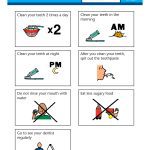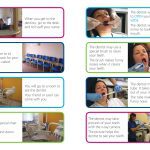People with Additional Support Needs
Individuals with additional support needs may need some extra support keeping their teeth and mouth healthy and accessing the right dental care.
Care providers play a vital role in supporting individuals to maintain their oral health. It’s also important for care providers to monitor any changes in an individual’s mouth, seeking advice from a dental professional should they have any concerns.
How to support the oral health of people with additional support needs
Oral Health Care Plans:
Individuals should have an oral health care plan which lists all the necessary daily care and dental check ups they require. Most people with additional support needs will have their own teeth, however, even for those without, a daily oral health routine remains essential.
On the left you will find:
- Oral Health Risk Assessment – A checklist to help identify oral health care needs for the person(s) you care for
- Oral Care Plan – This document can be used to establish an oral care plan for the person(s) you care for
- Daily Oral Care Record – A tool to record daily toothbrushing
If you care for someone as part of your professional role, Health Scotland have developed a series of oral care plans which can be used to help you support their oral health. Adapted versions of these resources can be downloaded on the ‘Care Providers’ page.
Oral Hygiene Advice
Visit our Care Providers section which contains information and advice about supporting someone to maintain their oral hygiene.
Dietary Advice
Try to keep sugary foods and drinks to mealtimes only. Some healthy snack ideas include fruit, veggie sticks, oatcakes, toast, low fat crackers and cheese or breadsticks and a sugar-free dip such as hummus or tomato salsa. The only drinks which are safe for teeth between meals are milk and water.
Medicines often contain high amounts of sugar which can harm teeth, especially if taken long term. Fortunately, many of the medicines required by those with additional support needs are now available in sugar-free varieties. Be sure to ask your doctor or pharmacist for the sugar-free option if available. If the medicine does contain sugar, try to take it at mealtimes unless advised otherwise. If the medicine is to be taken before bedtime, be sure to brush teeth afterwards. Some medicines can cause the mouth to become dry which can also harm the teeth. Speak to your dentist if you are concerned.
NHS Grampian have developed two accessible oral health information leaflets for those with learning difficulties entitled ‘Keep Your Mouth and Teeth Healthy’ and ‘Going to the Dentist’. These can be downloaded by clicking the images to the left. The EasyHealth website also contains a wide selection of accessible oral and general health information resources, including videos and downloadable storyboard pamphlets.
For further information or advice about looking after the oral health of the person you care for, contact your dentist or the free NHS Grampian Healthline on 0500 20 20 30.






